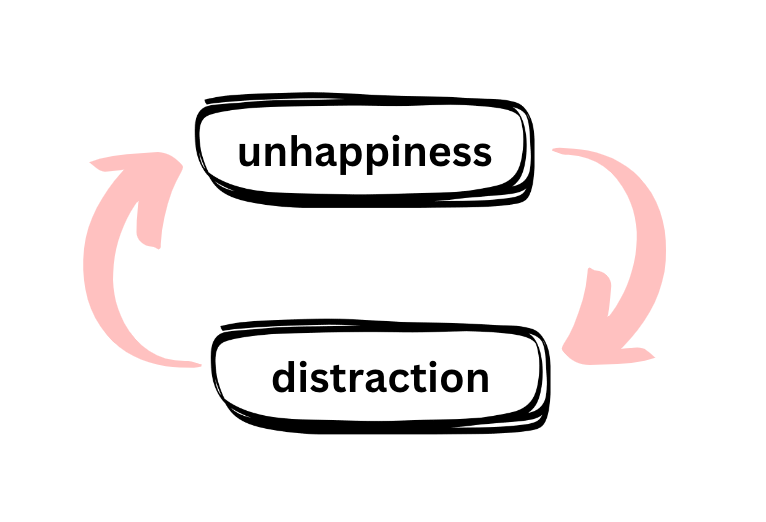- Ava's Pages
- Posts
- 7 Subtle Signs You're Unhappy
7 Subtle Signs You're Unhappy
(we all have them)
3 years ago I moved to an island in an attempt to escape the painfully perfect life waiting for me.
The day I graduated as a dentist, right on the podium, 30 years of life flashed before me:
a stable job
a good income
a nice house, good friends, great relationship
It was the perfect dream that led my mom here to the US, sacrificing her whole life for mine.
Yet in the very moment I achieved it, I’d wished the floor would open up and swallow me inside.
Everything was perfect and it gave me the ick.
Maybe because I was far from perfect. And being unhappy while you have literally nothing to be unhappy about felt like an incurable existential disease.
Or maybe, just maybe, a perfect life doesn’t make any of us happy.
This year is my first time back to Maryland during springtime. Flowers burst open in bright colors. Trees stretch tall into the sky. New leaves sprout with fresh excitement to be alive.
But they can’t seem to reach any of us with their vigor.
Everyone around me is unhappy.
My first day back, I encountered a series of events that shocked me. It feels like there’s an invisible force field separating us from the touch of life.

image generated by DALL-E
There are patterns that I’ve noticed in my friends, family and strangers alike:
1. Always busy
Having nothing to do today is a social sin. Everyone is busy.
Subconsciously, no one dares to do anything for the sake of doing it. There has to be reason or accumulation towards a grander benefit.
Even when they take time for themselves, they are consciously planning the next task or worrying about something they forgot to do.
Everything they do is for the sake of finishing it.
The meaning of life is reduced to a list of tasks that never stop growing.
2. Always complaining
My teenaged cousins complain about their parents.
My millennial friends complain about their partners.
My boomer parents complain about politics.
Something is always wrong. And having something to complain about is relatable and (somehow) funny.
Misery loves company.
There is so much company today that it’s normal to be miserable all the time.
3. Judgmental

Photo by Ghana Shyam Khadka on Unsplash
There is a negative implication behind the word judgmental. It gives the immediate impression that being judgmental is judging someone negatively.
This isn’t true.
Being judgmental is failing to see things as a state of being.
For example, you can make a comment saying “that girl has a very athletic build and a nice body”.
There is no ill-intention in saying that, but in doing so, you’re failing to recognize her liveliness, her essence, her being.
When you choose to firstly notice the appearance of people and things, you are subconsciously labeling them as good or bad, nice or not nice.
This is judgment.
Good judgment is also judgment. And when you fall into the habit of judging, you inevitably judge yourself.
If we judge that we are better than those around us, we get trapped in the ego’s lure.
If we judge that we are worse than others, we struggle with insecurity.
Judging is the veil that keeps us from seeing things clearly as they are. It’s what prevents us from finding peace within ourselves.
4. Quick to get offended
A happy person knows that no matter how other people see her, it cannot change the way she sees herself. Like a perfectly still lake that reflects exactly the mountains sitting above it. Her true self cannot be compromised by the opinion of others.

Photo by Joshua on Unsplash
But when the lake is full of ripples, you cannot see clearly what is there.
All the beauty that is you is lost.
You become insecure. You are easily offended because unless everyone sees the same thing, you don’t believe your beauty exists.
5. Consumed by problems
We all have problems. Some of us more than others.
But here’s the thing: the extent of our problems is relative only to us — the person who carries the problems. No one else.
It doesn’t matter if my problem is I’m going to lose my job and get evicted, and yours is getting in a fight about what to eat with your partner. The only thing that is comparable is your past problems, your perception of your problems, and your ability to handle them.
And people are becoming more and more consumed by their problems. To the point that they are drowning in it and there is no way out.
In other words, our threshold to handle problems have significantly decreased while our tendency to notice problems have significantly increased.
6. Quick to defend/justify
Justifying or defending oneself is the telltale sign of unhappiness.
It is because you know deep down, the thing you are defending is the root cause of your problem. Yet it is easier to give it reason to exist than finding ways to fix it.
The truth is nobody cares why you do the things you do. When you feel the need to justify/defend yourself, know that it is only a need to lie to yourself.
7. Addiction
Everyone is addicted to something because there is a deep urge to escape from their mind — video games, social media, TV, etc.
An unhappy mind wants distraction. A distracted mind creates unhappiness.

Distractions come up on their own, but we also seek them out when an uncomfortable feeling arises. To take a negative feeling and stuff it so deep down inside that we don’t even notice when it arises again.
But positive and negative feelings do not exist independently of one another.
Like light and dark, they are 2 opposites of the same spectrum.

Photo by Alex Padurariu on Unsplash
You cannot say: I only want the head of the coin, not the tails.
If you cannot see a coin fully for both its faces, you cannot recognize a coin at all.
If we cannot recognize happiness, how can we learn to strengthen and cultivate it inside us?
I don’t write to demonize our way of being. Recognizing these signs in people helps me become aware of my own state. In truth, there is a little bit of all 7 signs within me.
Becoming aware of them is the first step.
The second step is to study them closely.
If you look deeply, you will understand where they come from and why they continue to exist within you.
With understanding comes compassion.
Like a friend who did something that hurt you, but then you sit down and talk about it. You realize the suffering she is going through and you stop being mad at her.
It’s very important that you cultivate compassion within you. The friend who hurts you and the friend who forgives you are the same.
Without compassion, you will be running rather than healing yourself.
And when you are always running, you are like the owner who is never home to care for his garden. Anything and anyone can enter it and destroy it.
That is the lure of the perfect life.
It keeps us constantly chasing after something external, and we are never home to take care of ourselves.
— A